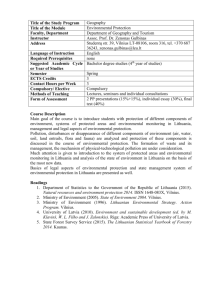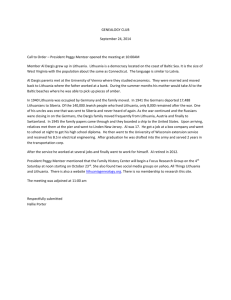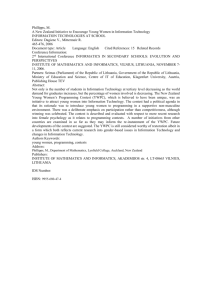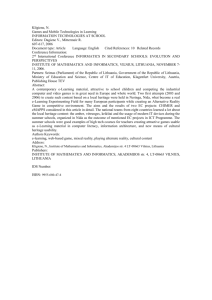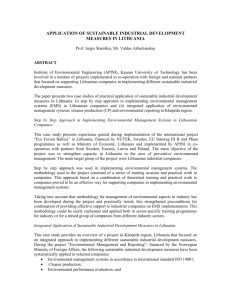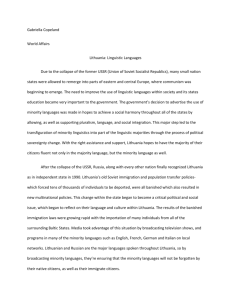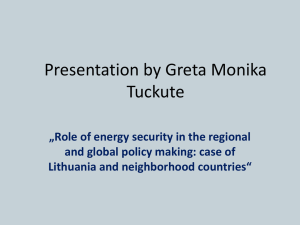Prieš dvejus su puse metų pradėjau antrą kartą eiti Lietuvos
advertisement
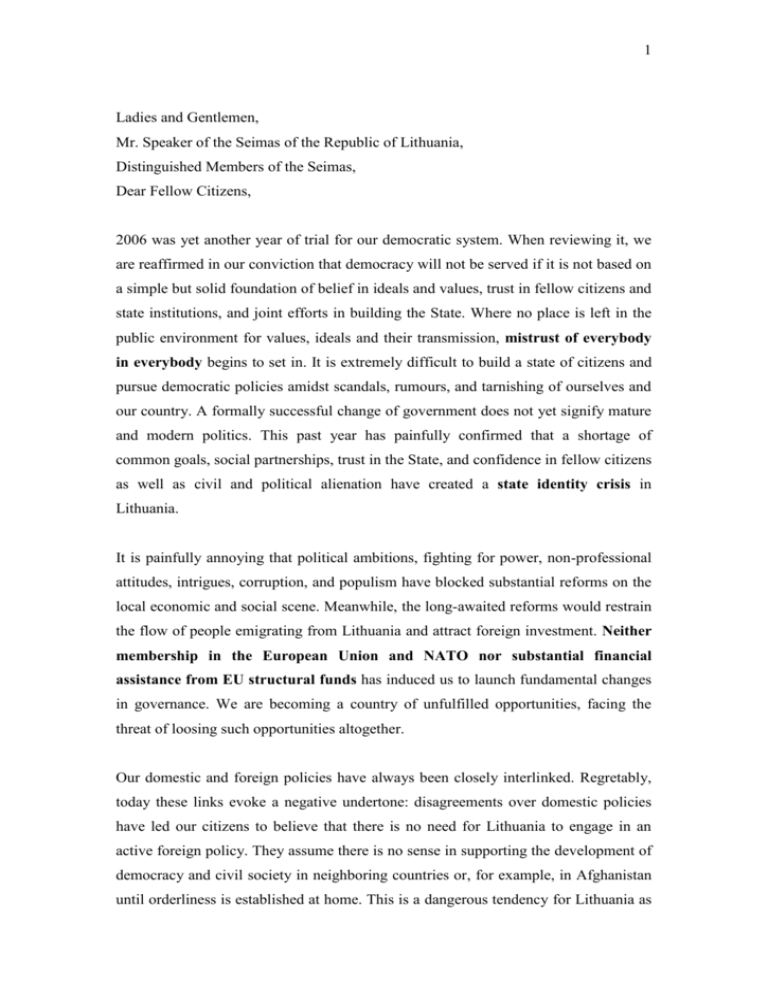
1 Ladies and Gentlemen, Mr. Speaker of the Seimas of the Republic of Lithuania, Distinguished Members of the Seimas, Dear Fellow Citizens, 2006 was yet another year of trial for our democratic system. When reviewing it, we are reaffirmed in our conviction that democracy will not be served if it is not based on a simple but solid foundation of belief in ideals and values, trust in fellow citizens and state institutions, and joint efforts in building the State. Where no place is left in the public environment for values, ideals and their transmission, mistrust of everybody in everybody begins to set in. It is extremely difficult to build a state of citizens and pursue democratic policies amidst scandals, rumours, and tarnishing of ourselves and our country. A formally successful change of government does not yet signify mature and modern politics. This past year has painfully confirmed that a shortage of common goals, social partnerships, trust in the State, and confidence in fellow citizens as well as civil and political alienation have created a state identity crisis in Lithuania. It is painfully annoying that political ambitions, fighting for power, non-professional attitudes, intrigues, corruption, and populism have blocked substantial reforms on the local economic and social scene. Meanwhile, the long-awaited reforms would restrain the flow of people emigrating from Lithuania and attract foreign investment. Neither membership in the European Union and NATO nor substantial financial assistance from EU structural funds has induced us to launch fundamental changes in governance. We are becoming a country of unfulfilled opportunities, facing the threat of loosing such opportunities altogether. Our domestic and foreign policies have always been closely interlinked. Regretably, today these links evoke a negative undertone: disagreements over domestic policies have led our citizens to believe that there is no need for Lithuania to engage in an active foreign policy. They assume there is no sense in supporting the development of democracy and civil society in neighboring countries or, for example, in Afghanistan until orderliness is established at home. This is a dangerous tendency for Lithuania as 2 member of the international community, even though until now it has pursued a successful foreign policy. Therefore, I feel committed to single out Lithuania’s most serious problems and fields for immediate action. First, we have to change the general spiritual climate in Lithuania and resist aggression, disrespect, cynicism, and alienation that have permeated all layers of society. We have to overcome widespread mistrust which has become alarmingly profound. Second, we have to use the existing political and economic preconditions to step up the development of well-being and progress in Lithuania. There is no need to search for a new course of action. We merely have to use the unique opportunities offered to Lithuania by its international security guarantees, prevailing economic tendencies and EU support to make every single person feel the progress achieved by the State. I believe that the way citizens feel in their own country and the country’s spiritual and social climate are the main indicators of national progress. Unfortunately, today Lithuania notably lacks solidarity, confidence, and tolerance, both among social layers and state institutions. In the course of only several months, our legislature exposed its differences and frailty. It became involved in dangerous political power games, ignoring its high duties of law-making and parliamentary control. Today, it is evident that governmental institutions find it hard to contain themselves within the boundaries established by the Constitution and laws. The prolonged debates over the State Security Department and its activities have proved to be an exceptionally painful trial for Lithuania. The investigation conducted into the Department’s activities gave rise to many questions concerning the content and limits of parliamentary control. It also exposed a major shortcoming of Lithuania’s national security system: lack of coordination of the work performed by security institutions. I have serious doubts that everything possible was done in the course of this investigation to prevent causing damage to the State Security Department and to retain the trust of our foreign partners. Regrettably, neither satisfactory coordination nor efficient supervision system of special services was introduced in the period of seventeen years of independence. These functions are still spread among several departments. We have to admit that today there is no competent 3 institution in Lithuania to assess national security, single out and analyze the most serious threats, define essential tasks for special services and determine more clearly the spheres of their competence and the limits for exercising control over them, including parliamentary control. The institution would certainly help avoid occasional control and prevent attempts to manipulate such control. Therefore, I urge the Seimas to work out a clear-cut procedure for regulating parliamentary control and exercise it within the framework established by the Constitution and laws. The practice of resolving such matters and establishing the rules of procedure in the course of investigation cannot be tolerated since it raises even more doubts about the objectivity of the investigation. If we wish to restore trust and confidence in the State Security Department in the eyes of our citizens and foreign partners, we must block all attempts to use the Department, its officers or collected materials for waging political battles. The events of this past autumn cannot happen again. The Department became a hostage to political emotions and opinions because the information it had collected in an unbiased manner did not suit some politicians but appeared to be important to others. The incompatibility of such information with the objectives of some political forces hurled the Lithuanian special service into the whirlpool of politics. I think that all of us had to learn this lesson and realize that the State Security Department, as a special information service, is only a supplementary instrument for state leaders and politicians in decisions on foreign, defense and national security matters. Such a situation may produce long-term negative consequences. The Seimas has focused on debates about the State Security Department, ignoring other fields of its work. The badly needed changes have slowed down to a halt. If we concentrate on a single problem and do not implement essential reforms, we will lose our potential and fall behind other new EU member states. I have noticed increasingly more often the alarming tendency to put off the deadline for delivering commitments – which has resulted in faltering reforms, unrealized opportunities, and the public’s diminished trust of the government and the State. 4 At the very start of my term in office, I highlighted the priority fields to be reformed: health care, science, education, and the judicial system. To effect actual changes, a new draft law on courts was submitted to parliament, meetings were initiated to discuss health care and higher education reforms, possible models of action were deliberated and ideas developed. However, the absence of joint efforts and lack of productive cooperation between the Seimas and Government have prevented us from implementing fundamental reforms. Distinguished members of the Seimas, it is evident that we have not moved a single step forward. Without your resolve and determination to participate in the process of reforms, changes will never be effected. Agreement between all political forces supporting the Government and stability in their actions are required to accelerate the reform process. This is possible only on the basis of common decisions and negotiations – not through imposed viewpoints. Regrettably, today the Government is more worried about its own survival than about reforms. On the one hand, even being in this situation does not relieve the minority Government from responsibility and commitments. On the other hand, I would urge political parties to be more careful in assessing the Government’s performance because it is difficult to make resolute decisions when there is no agreement in the Seimas. On my part, I will evaluate the Government only on the grounds of the work performed and the pace of reforms. I hope that the Cabinet of Ministers will have sufficient political will and determination to translate its promises into action. Stability verging on stagnation has never been and will never be acceptable to Lithuania. It is evident that the current pace of reforms is unsatisfactory. The health care reform, indispensable for the people of Lithuania, has bogged down. I believe that this has happened because of fear to take unpopular although necessary decisions to improve the system and tailor it for the patient. I often hear talk about an ongoing health reform, restructured health care establishments, and increased pay in the medical sector. It is true that restructuring is a positive development, but only when it is carried out naturally and shaped by modern treatment technologies and economic laws – not by the central government. Meanwhile, the first stage of this process has only 5 exposed the deficiencies of the system. Large health care establishments were merged into even larger entities, competition was discouraged, and access to services was tightened. The process is actually directed only at saving funds, while patients have to search for byways to quality services. Quite naturally a question arises – what is the purpose of this reform? I have repeatedly said that the pay received by the medical people is beyond criticism. I am nevertheless convinced that salaries should be predetermined by qualitative and quantitative factors – not political decisions. All previous governments have acknowledged that more expensive technologies and the aging society will boost health care expenditures. However, there is an unwillingness to admit that the government cannot and will not be able satisfy the ever growing needs. An immediate effort should be made to search for ways to rationalize expenses and attract private funds. At the same time, we have to further develop the model of compulsory health insurance, expanding supplementary insurance and creating a mechanism to convert unofficial payments for medical services into official fees. I would also like to see a more definite social policy, encouraging people to trust their own potential and ability. We need an immediate and fundamental social policy reform, which would make people focus on income from work rather than on social benefits from the budget. The required conditions are particularly favorable at the present moment because the rate of unemployment has declined due to economic emigration and employment opportunities have increased. When meeting with people, I often hear them complain that the government is concerned only about dysfunctional families, while decent and hard-working people, slightly exceeding income and property thresholds, are left outside the welfare system. The most recent studies also show that poverty is passed on from one generation to another and that families supported by welfare cannot and sometimes do not wish to escape the poverty trap. Let us stop listing problems that are obvious and discussing ways how to reduce poverty. Instead, I would invite us all to take real action. Municipal authorities should engage local communities in the development of an efficient and flexible network of social services to protect families from social 6 exclusion and poverty. More of self-reliance and personal responsibility for own life will reduce dependence on government handouts. At the same time, it will diminish the possibility for politicians to engage in a populist manipulation of promises to increase social benefits. Ladies and Gentlemen, If we wish to sustain a competitive economy, we should not forget that we live and operate within the common European market and that integration into the global market will surely grow. Unfortunately, state institutions often prefer to take the easiest road and focus only on the financial aspect of developing and spreading innovations. But where are the decisions creating an investment-friendly environment? Although we openly declare Lithuania’s aspiration for developing businesses based on advanced technologies and qualified labor force, we still lack resolve and determination to set the ceiling for Sodra contributions – a step which, as we have all agreed earlier, would surely promote competitiveness! I have repeatedly underlined that if we wish to reform our social system and create an economy based on qualified work, knowledge, and high technologies, we need to reform Lithuania’s system of higher education and studies. It should promote business and science contacts so that young graduates can compete on the labor market. It is evident that investments into the employee sector are needed to keep business development smooth and stable. The government could also contribute by creating the required legal preconditions to encourage the flow of private capital into the education system. The faster links are forged between business and educational establishments and the sooner scientific achievements are introduced into business, the more rapid the growth of Lithuania’s competitiveness and the more effective the creation of a modern knowledge society. It is essential to reform and enhance vocational training along the same lines. Only a modern vocational training system brought closer to business can offer young people a wider range of education profiles and reduce the number of low-motivated students in schools of higher education. I would like to point out that not a single university in Lithuania has been included in the list of top 100 universities of the world. If in the near future we do not change our attitude to higher education and universities, Lithuania will be trapped in yesterday’s 7 realities and administrative and political battles, completely alienating the best members of the Lithuanian science community. I am confident that genuine competition among the establishments of higher education would contribute to an essential transformation of the academic environment. It would be expedient to introduce the “funds-follow-the-student” principle, which has proved so successful within the school system, engaging students and business structures in the funding of studies. The system of loans should be also developed to prevent higher education from becoming a privilege for the rich. Formally, higher education reforms have already been launched. The Higher Education Development Plan for 2006-2010 and its implementing measures were approved last year. However, we cannot as yet notice any actual changes in higher education. The draft agreement worked out by political parties at the beginning of this year to reform the education system seems to have been back-shelved. I would like to remind everybody that political parties, which evade responsibility for introducing actual changes, will have to take full blame for thwarted reforms and the damage done to Lithuania today and tomorrow by the defective education system. I invite all political parties to decide on the future model of the education system and pass the required legislative amendments during this session of the Seimas. We have to join our efforts and turn September 1st into a symbolic gateway to reforms and we have to focus the next year’s budget on advancing essential changes in the system of education and studies. Once again, I would like to underline that today’s delay is a verdict for the future. There is no other place but educational establishments to offer us hope for building a civil and unified society, European awareness, and patriotism. Humanitarian and social sciences play an exceptional role in this respect. Although the problem has been discussed many times, the humanities are actually humiliated and treated like a dependant of the so-called “real” sciences. What cultural values and what kind of a critical mind will develop under such circumstances? Does Lithuania still need humanitarian education? Does it need citizens capable of making a critical analysis of our past and present history, resistant to manipulation, appreciative of democratic values and determined to protect our ideals? 8 I have just touched on patriotic education, which has unfortunately become an offside issue. While protecting its economic or political interests, Lithuania seems to have forgotten about such core values as national memory, respect for freedom fighters, trust and pride in our State. Meanwhile, it is namely moral ideals and national selfawareness that develop the potential and the will power of a people to realize fundamental rights. Paradoxically, new generations are growing up in independent Lithuania, which seem to have no perception of our national historic landscape and no sentiment for basic existential liberties. On the other hand, how can we criticize educational establishments when values and ideals are publicly ignored in respect of the crimes committed during Soviet occupation? Instances of xenophobia surely bring no respect for Lithuania. A society which has no courage to openly face its own history and no will power to pass on its painful experience to the next generations will never be either open or united in solidarity. Communities of independent, creative and broad-minded citizens cannot exist without a cultural dimension. Therefore, I would encourage pursuing a more dynamic cultural policy based on cooperation with local municipalities, promoting the fusion of regional initiatives with mainstream activities and extending culture to Lithuanian provinces. Only those citizens who are included into the culture process will develop solidarity and civil awareness. We have to make each person feel a full-fledged member of the community known as Lithuania if we wish this community to stop shrinking. Many emigrants say that they have left Lithuania not only for economic reasons, but also because of the general environment lacking social contacts and brimming with widespread disrespect and bureaucratic aggression. They left because they lost hope to withstand and protect their interests and human dignity. Ladies and Gentlemen, An independent, transparent and effective system of courts, open to all, should ensure justice. We need to eliminate the evident shortcomings of the judicial system to restore public confidence in justice. Otherwise, people will continue to mistrust courts of law and the State, while human rights and freedoms enshrined in the Constitution will remain mere words. 9 I call on members of the Seimas to speed up parliamentary deliberations on the draft law on courts. This law has the objective to guarantee an independent and efficient work of judicial institutions and their accountability to society. I would also suggest working out a mechanism to pave the way for a more open access to the Constitutional Court by citizens determined to protect their constitutional rights. We have more than one ruling of the Constitutional Court pronouncing the decisions issued by some institutions as unconstitutional. The more citizens believe that their rights and beliefs are respected in real terms and that they are protected by the legal system, the sooner they will regain confidence in the State. Legal nihilism and disrespect for the law have started to gain ground in politics and public life. Openly voiced accusations of corruption and other offences as well as questionable decisions have unfortunately become part of our every-day politics. I am convinced that timely action by law enforcement bodies and their coordinated work would not only avert unnecessary tensions, but would also discourage such tendencies. I appeal to the heads of law enforcement institutions: you have been entrusted with the supervision of legality and lawfulness; it is therefore your duty to guarantee the equality of all before the law. Even the thickest of the walls of governmental institutions should not affect the impact of legal norms and principles. Within this context, it is appropriate to discuss the expansion of possibilities for citizens to protect their rights. Regrettably, the constitutional provision that state authorities serve the people is merely a resounding phrase today – not an actual guiding principle for governmental authorities. It gives rise to bureaucratic misuse of power, non-compliance with legal acts and established time tables, and also to a formal approach to the problems faced by people. In many cases, state authorities pursue their own interests, not those of the general public; therefore, people feel totally dependant on intricate red-tape procedures. It is too frequently that an “anonymous” system bears responsibility for power abuse and negligence instead of the actual persons who have made specific decisions. In this way, the guilty evade responsibility, while the State and citizens suffer huge losses. Thus are created ideal conditions for corruption. 10 Lithuania’s lowest rate of entrepreneurship in Europe shows lacking self-reliance and independence of our citizens. We can increase entrepreneurship only by eliminating bureaucratic barriers and improving the investment environment. This past September, I submitted to the Prime Minister specific propositions of principle for cutting down bureaucracy. Until now, no resolute efforts have been made to deal with this problem, regardless of the hazards it poses and despite the promises made by the Government. Society is therefore quite understandably disappointed in fighting corruption by words alone. The inexcusably protracted process of restoring ownership rights to land serves as a manifest illustration of thriving corruption. It can be described as the most ineffective and non-transparent project in re-independent Lithuania. The process lacked consistent regulation and efficient supervision, leading to the exploitation of legal loopholes. In addition to this, even before the land reform has been completed and property returned to all of its rightful owners, state-owned agricultural land – which belongs to the citizens of Lithuania – is being sold under easy conditions of sale. This is done in a hasty manner, without due account taken of the strategic interests of the State and without having decided on the most favorable conditions for a modern and competitive economy. In this way, the Lithuanian society will soon be left without recreational parks and forests, lake and river sides. Given the continuous flow of complaints that I receive about institutions regulating the return of land to its owners, I strongly urge to complete this process as transparently as possible and in due time – by the end of this year – thus eliminating a major source of corruption. A governmental working group established in the beginning of January had to present its proposals to the Strategic Planning Committee on how to complete the land reform rapidly and efficiently. Until now, however, no propositions have been submitted and no decisions have been taken. 11 The protracted and non-transparent land reform has resulted in the loss of billions of litas so badly needed for education, health care and social welfare. What is truly sad is that the “right of the strong” is thus legalized and moral values are discredited. In the eyes of the people, we are losing trust in the government and the State. To restore justice, mistakes must be admitted and rectified. Those areas where corruptive links have been established between governmental and business institutions pose a particularly serious threat to public interest. I therefore urge law enforcement bodies, the Seimas and Government to place a special focus on transparency in the allocation of EU funds and in public procurement. We must also review the policy of agricultural support so that farmers could cover their losses incurred by natural disasters without requesting state aid. The government cannot afford to compensate all such damages. Therefore, crop insurance must be introduced. Agricultural assistance should be focused on promoting efficient farming and ability to deal with business risks against the background of global competition. The completed land reform will allow to eliminate the duplication of governance functions at county level. It is becoming ever more evident that counties replicate the work which can be well performed by local municipalities, both through their own efforts and through regional representatives’ councils coordinating joint municipal projects. I therefore call on the Seimas and the Ministry of the Interior to pass relevant legislation in the spring parliamentary session of 2008 and repeal counties. I am convinced that it is a mere question of political will. Distinguished Members of the Seimas, Speaking about financial policies, it is greatly satisfying that concrete action has been finally taken to reduce taxes – a step that I started to strongly advocate several years ago. It provided an additional impetus for the development of economy and, despite previously voiced concerns, did not result in lower budget revenues. On the contrary, budgetary income was larger than projected and I would say that it was not predetermined only by growing wages and salaries. We cannot stop in the midway if we wish to continue on this road. I therefore invite to also reduce labor taxation more resolutely. I believe it would be expedient to review the taxation system and find ways 12 to bring personal income tax down to 20 percent as soon as next year. It would also be appropriate to revise the list of reliefs and adjust the funds allocated for budget programs – in other words, the budget should be balanced to prevent an artificial price rise and the “overheating of economy”. I would like to address the Government: I hope that the promise to draw up an efficient and result-oriented budget for the next year will be finally delivered. We need a budget providing for a rational use of taxpayers’ money to satisfy the ultimate objectives of our country and the basic needs of its people: to build social infrastructure, encourage personal entrepreneurship, promote administrative capacities and implement long-term projects to improve Lithuania’s image. Ladies and Gentlemen, We need more dynamic efforts by the State to attract foreign investment and tourists to Lithuania and to present Lithuanian culture to the world community. We should learn how to develop national image from neighboring countries. Daring innovations contributing to Lithuania’s progress may produce substantial material benefits and promote Lithuania worldwide, encourage international interest in our country and transform it from a support receiver into a support provider. A new stage of programming EU structural funds for 2007-2013 begins this year. We are facing a unique opportunity to achieve the strategic goal of catching up in economic terms with Europe – a task that I had put forth earlier – by coordinating EU structural support with domestic reforms. It will also provide us with a historic opportunity to realize other, no less important, obligations and enhance Lithuania’s international image. As we well know, in 2009 Lithuania will celebrate the millennium of the first mention of its name in written sources and Vilnius will become the European Capital of Culture. The European men’s basketball championship will be held in Lithuania in 2011. In 2013, when Lithuania takes over the presidency of the European Union, it will host many events of European importance. Such events will not only attract many visitors to Lithuania, but they will also require additional funds and will surely test our ability to organize and administrate celebrations on an international scale. I would therefore urge the Government to realize, escaping narrow departmental interests, these new 13 opportunities and streamline its administrative and coordination work towards presenting Lithuania to the world as a modern and investment-friendly country. Not to utilize EU funds adequately would be a fatal mistake. I would describe the sale of Mažeikių Nafta as a successful transaction. The received funds have made it possible to deliver the financial commitments assumed by the State to its citizens and take a major step towards Lithuania’s greater energy security. Nevertheless, we have to continue working consistently and pursue other strategic energy projects. Our ability to attain strategic energy goals greatly depends on efficient cooperation and teamwork with neighboring countries. Only working together we can build a bridge between Europe and the “energy island” where Lithuania is now located. Last year, many positive changes were effected in this field, including the successful sale of Mažeikių Nafta to European partners, agreements with Poland on connecting natural gas and power grids, and Lithuania’s, Poland’s, Latvia’s and Estonia’s plans to build a new nuclear power plant together. Joint projects with neighboring countries should be placed on top of Lithuania’s list of priorities for both the energy sector and foreign policy agenda. When assessing Lithuania’s present position against international background, we should be delighted, and proud, that our consistent and principled diplomatic efforts have established Lithuania on the world map and have made the international community understand and support its actions. The Baltic region has emerged as a model of regional integration to be followed by many Europe’s Eastern neighboring countries. The Vilnius Conference has already gained international respect as a forum for strengthening good-neighborly relations between new European democracies, discussing ways of forging cooperation links with Russia based on values and principles, and inducing Europe to speak in one voice with this particular strategic neighbor. It is very important for us to keep this experience intact and retain Lithuania’s status of a reliable Euro-Atlantic partner. To this end, we have to further pursue a coordinated foreign policy, preventing separate ministries from taking on foreign policy functions. 14 Last year we gained several significant victories: Lithuania received the right to accede to the Schengen area and the problem of oil supplies is now tackled by the whole of Europe. It signifies that consistent and streamlined activities and speaking in one voice serve the interests of Lithuania in a major way. We cannot afford to repeat such mistakes as our failure to introduce the euro. Meanwhile, the benefits of the single European currency could have been already enjoyed by businesses and citizens alike. We must also do our “homework” when preparing for EU presidency in 2013. I am confident that Lithuania’s presidency of the UN Economic and Social Council this year will once again establish it as a dynamic and responsible actor of the international community. It will give us all practical leadership experience which we will put into use in 2013. Lithuania’s current foreign policy is targeted at two objectives. First, together with our strategic partners in the Baltic capitals of Riga and Tallinn, in Warsaw, the whole of the European Union and in Washington we have to seek effective decisions for the further integration of our region and closer contacts with Western Europe. Second, we have to supplement the list of Lithuania’s foreign policy priorities with new political and security partnerships in the East and South Caucasus. By contributing to the spread of innovations and values in Eastern neighboring countries, by supporting their reforms or designing common infrastructures, we are working for our own benefit and that of our neighbors. For us, it is important that Belarus is not separated from Europe because of its government’s actions. We might say that we continue to pursue the historic mission of a country connecting rich and similar cultures of Eastern and Western civilizations – their unity and diversity respected as a great asset. We have already understood that membership in the European Union and NATO is not a self-serving goal; it is rather a significant instrument for the modernization of our State. However, we should not perceive Euro-Atlantic integration as only the emergence of European well-being and western living standards in our every-day life. Strangely and paradoxically enough, it is a broader and more fundamental selfawareness within the EU and NATO that we mostly lack today. Lithuania’s course of 15 foreign policy chosen ten years ago and the pace of our advancement, leading to incredible changes in this country, should be continued along the path of reforms to be followed by our partners and the entire European Union. We must spare no economic or institutional effort to help establish security and stability in Eastern neighboring regions. It will notably reduce potential threats to the people of Lithuania, its statehood and economy. Ladies and Gentlemen, The experience gained over seventeen years of Lithuanian independence shows that it is easier to restore an independent state than to liberate ourselves and resist influences. Today Lithuania mostly lacks solidarity and self-respect. It is only by fostering freedom and independence that we will create a state of citizens – not of administrators and subordinates. Building trust and solidarity is the most straightforward way to overcome the current state identity crisis and other challenges. I have always said and today I am more than ever convinced that only policies based on respect for fellow citizens and the State have prospects for the future. The trust of citizens and the will of voters have committed us to make a joint effort for the development of such policies. So let us feel responsible for keeping public confidence intact. Let us feel bound to work hard and consistently to change ourselves and Lithuania. Let us build Lithuania on the pillars of trust and confidence.
